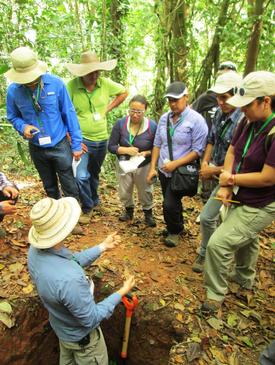Ecosystem Services and Tropical Forest Restoration
Summary
Understanding the fundamentals underlying forest ecology and the use of tropical forests has become indispensable to manage the provision of ecosystem services in a sustainable manner in highly fragmented landscapes. While in recent years valuable information has been generated in multiple research projects, it has not been effectively transmitted to the various bodies that influence the management of forests. In fact, within Panama and Latin America there is a great need for training opportunities to help guide informed decision making about the management, use and restoration of tropical forests. Since 2007, the Environmental Leadership and Training Initiative (ELTI) has been facilitating conferences and training courses in order to provide different stakeholders with the knowledge and tools on how to conserve and restore forests and biodiversity in the tropical regions of Latin America and Asia.
This field-based course will take place at ELTI’s Permanent Training Site, established within STRI’s Agua Salud Project area, located in the Panama Canal Watershed. ELTI’s Training Site conveys ecological principles and current STRI scientific research through its interpretative trail network and demonstration sites. In addition, the course will highlight Agua Salud research, which seeks to understand and quantify the ecological, social and economic services provided by tropical forests in the Panama Canal Watershed undergoing different types of land use and the effects of climate change. Such ecosystem services play a central role in human livelihoods as well as directly in the operation of the Panama Canal and subsequently world commerce. Over a period of six days, the course aims to provide the technical basis necessary to design and implement restoration strategies to increase forest cover and the provision and regulation of ecosystem goods and services in modified landscapes, with particular focus in important watersheds. The course has been designed to convey the advances in ecology and restoration of ecosystem services to participants through a series of field-based observations and exercises. Participants will have the opportunity to learn and exchange experiences, concepts and practical tools with ELTI facilitators and international experts. Specifically, the course will include lectures and field visits to demonstration sites that illustrate the importance of the scientific method and data analysis for developing sound restoration strategies.
Foresters, natural resource managers, extension agents, consultants and other professional practitioners from institutions focusing on sustainable land management and forest restoration in Latin America are encouraged to apply.
Content
Module 1. Forest ecology and the provision and regulation of ecosystem services
- Introduction to tropical forests ecosystems of Central America
- The provision and regulation of ecosystem goods and services
- Introduction to tropical forest dynamics
Module 2. Limitations for the restoration and provision of ecosystem services
- Introduction to regional drivers of tropical forest deforestation and degradation
- Ecological and social consequences of degradation and barriers to restoration
Module 3. Strategies for the restoration of ecosystem services in human-modified landscapes
- Importance of defining management goals and accounting for biophysical and socioeconomic site conditions
- Principles and methods of forest restoration and the range of passive to active restoration strategies
- Financing the restoration of productive landscapes


